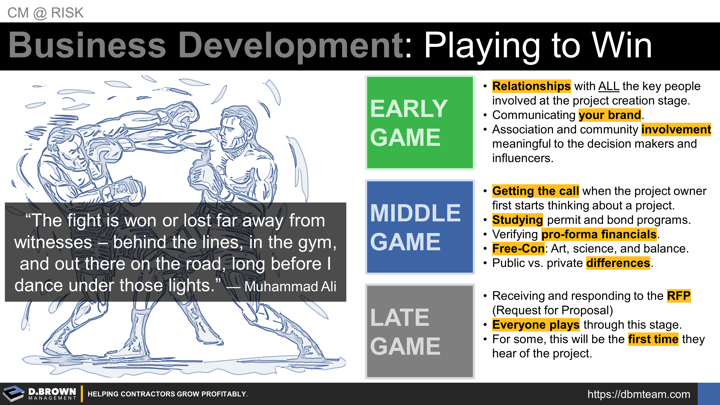"The fight is won or lost far away from witnesses - behind the lines, in the gym, and out there on the road, long before I dance under those lights." - Muhammad Ali
Whether you are a boxing fan or not, those words of wisdom apply in most areas of life and business - especially when it comes to winning work. Think about winning projects in three broad phases:
- Early Game
- Middle Game
- Late Game
The specific strategies and tactics applied to each phase will be different depending on whether the work is public or private, size of the project, and the project delivery method.
As contractors navigate different stages of growth, they will be getting involved in the game progressively earlier. A contractor in stages 1-3 of growth is likely competing mostly in the late game and their focus has to be on operational excellence (OpEx). Looking all the way toward the other end of the growth spectrum would be Bechtel's business development philosophy:
- If we don’t have a client, we find one.
- If there’s no project, we assemble one.
- If there’s no money, we get some.
As a contractor navigates through stages 4, 5, and 6+ in their growth, they will be continually refining their market strategies including the ideal customer and project profiles. This is where the different phases of the game start to become clearer:
Early Game
- Building relationships with ALL the key people involved at the earliest stages of project creation - when the project is only a vague concept to support their future operations.
- Refining and communicating your brand - who you are as a contractor, your unique position in the market, and how that adds value to all stakeholders.
- Association and community involvement that is meaningful to the decision makers, influencers, and all other stakeholders.
- The prerequisite to participate in the early game is building deep levels of trust in all relationships.
Middle Game
- Getting the call when the project owner first starts thinking about a project.
- Studying permit and bond programs along with other market data.
- Verifying pro-forma financials for projects - and helping make them "Pencil-Out."
- The art, science, and balance of "Free-Con."
- Understanding the differences between public and private work processes.
Late Game
- Receiving and responding to the RFP (Request for Proposal)
- Everyone plays through this stage.
- For some, this will be the first time they hear of the project.
One of the first things that changes with growth is a contractor's market strategy. After these choices are made, the first tactical change must be the approach to winning projects. Successful growth requires that your market choices and approach to winning projects should be one stage beyond where you are currently at. You want to make sure you have a rigorous opportunity go/no-go process in place to ensure that you are:
- Seeing the types of opportunities for where you want to be in the future.
- Not over-extending beyond current operational capabilities and capacity.
These changes will start with senior management including owners leading the way, typically very intuitively. With growth and over time, these intuitive actions and decisions will evolve into systems, tools, and new job roles.
An experienced and unbiased 3rd party can be extremely valuable in helping you evaluate and refine your approach toward winning the right projects. Please contact us to talk through the specifics of your situation including:
- Starting to, or significantly increasing, the amount of negotiated work you perform.
- Adding a dedicated business developer role.
- Adding business development responsibilities to team members in preconstruction, estimating, and/or operations.
- Adding conceptual estimating and preconstruction capabilities.

